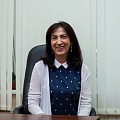As of 01.12.2023
The research of urban agglomerations – metropolises – is one of the most important interdisciplinary scientific problems of our time outlined in fundamental documents of the United Nations, the World Health Organisation, the national projects of the Russian Federation «Ecology» and «Healthcare» and national strategies of environment enhancement. Population growth in the largest cities is accompanied by the concentration of of transport, industry, waste, drastic changes to the environment. In major cities, temperature, wind and humidity fields, and the atmospheric radiation regime form peculiar «heat islands» that are starkly different from the surrounding territories in terms of their meteorological characteristics and processes. These aspects also affect other components of the urban environment. All the components of the urban environment – the atmosphere (aerosols, atmospheric precipitation, snow), urban soils, road dust, surface waters – withstand high anthropogenic pressure with the formation of «pollution islands» with radii of tens and even hundreds of kilometres. As a result, the urban environment is a «pollution and heat island». It affects the quality of life in cities, especially in metropolises where millions of people live. In Russia, Moscow is such a megapolis.
The currently existing approaches, methods and technologies for the study of urban environments operate on the level of single components and are practised mainly within specific fields of studies. At the same time, the complexity of yet not quite explored physical and chemical process of interaction between the components of the urban environment requires the creation of a new comprehensive integrated research technology that would consider cities as peculiar anthropogenic geosystems. This technology is based, firstly, on the integration of modern methods of atmospheric physics, climatology, geochemistry, hydrology, and human ecology in the study of the components of the environment of metropolises and, secondly, on a unified basic research object both in the atmosphere and in the pedosphere and hydrosphere – micro- and nanoparticles that are the main carriers of contaminating substances and determine the essence of many physical and chemical processes taking place in these components of the urban environment as well as influence the health of the population. Such an integrated approach is used for the first time in Earth studies and life sciences.
Name of the project: The metropolis as an island of pollution and heat: an interdisciplinary hydroclimatic, geochemical and ecological analysis
Goals of project:
The goal of the project is the creation of the scientific foundations for the interdisciplinary assessment of the state of a metropolis – «an island of contamination and heat» – by the example of Moscow using modern field survey methods of physics and chemistry and numerical modelling. To implement this project, we will create the Laboratory of Urban Environment Quality at the Faculty of Geography of the Moscow State University that will engage scientists from the Skobeltsyn Institute of Nuclear Physics of the Moscow State University (SIMP MSU) and the Research Computing Centre of the Moscow State University as well as the Hydrometeorological Centre of Russia. The Laboratory will be supervised by Markku Kulmala – a recognised world leader in this field of studies. The study of the climate and the ecology of cities is the most important component of geographic and geophysical sciences. The development of a system for the observation and numerical modelling (in particular, using the so-called «seamless modelling» technology) of «islands of contamination and heat» at various temporal and spatial scales in these conditions becomes one of the most relevant problems aimed at the understanding of complex physical and chemical processes of their formation.
|
Hosting organization
|
Field of studies
|
City
|
Invited researcher
|
Time span of the project
|
|---|---|---|---|---|
|
Laboratory of Geochemistry of Natural Waters (10)
M.V.Lomonosov Moscow State University - (MSU) |
Earth studies and related Ecological sciences |
Moscow |
Konoplev Aleksei Vladimirovich
Russia |
2024-2028 |
|
Laboratory of Macromolecular Design (10)
I.M. Sechenov First Moscow State Medical University - (Sechenov University) |
Earth studies and related Ecological sciences |
Moscow |
Kostjuk Sergei Viktorovich
Belarus |
2024-2028 |
|
Laboratory «Soil Health»
Southern Federal University - (SFedU) |
Earth studies and related Ecological sciences |
Rostov-on-Don |
Wong Ming Hung
, United Kingdom |
2022-2024 |





